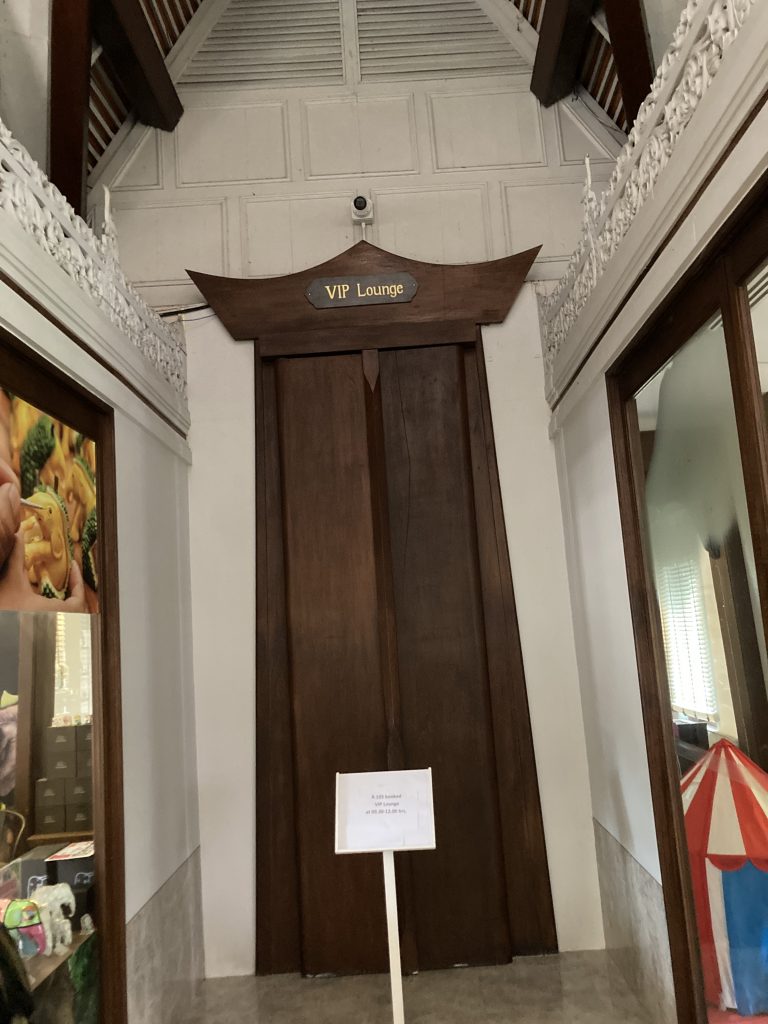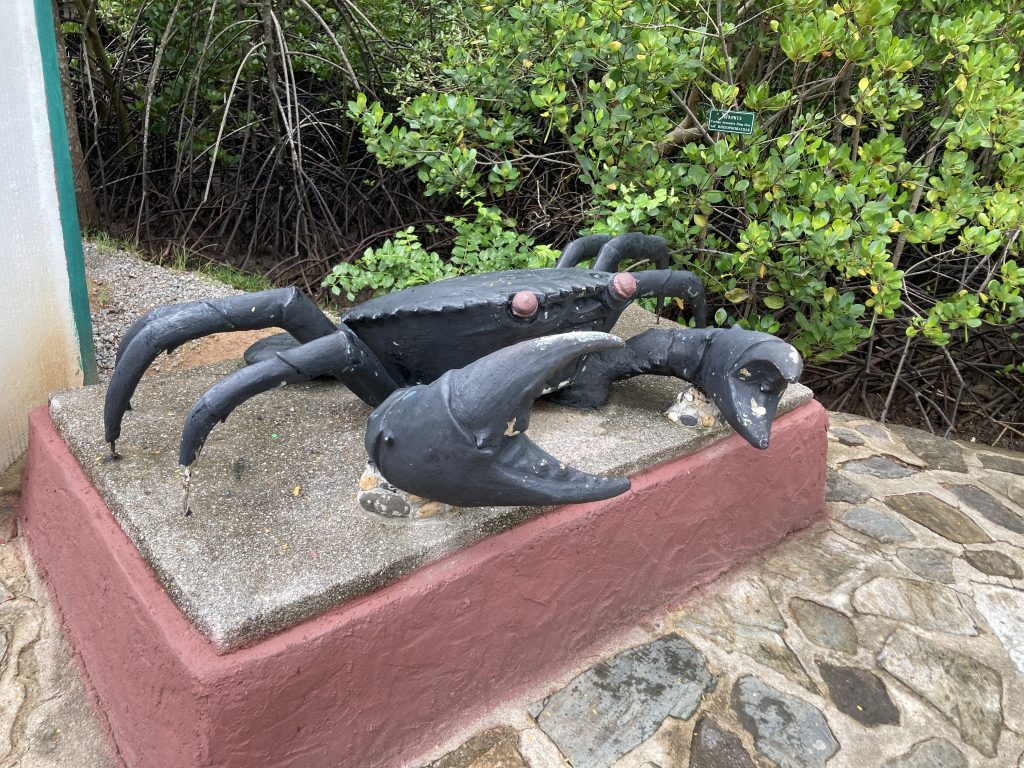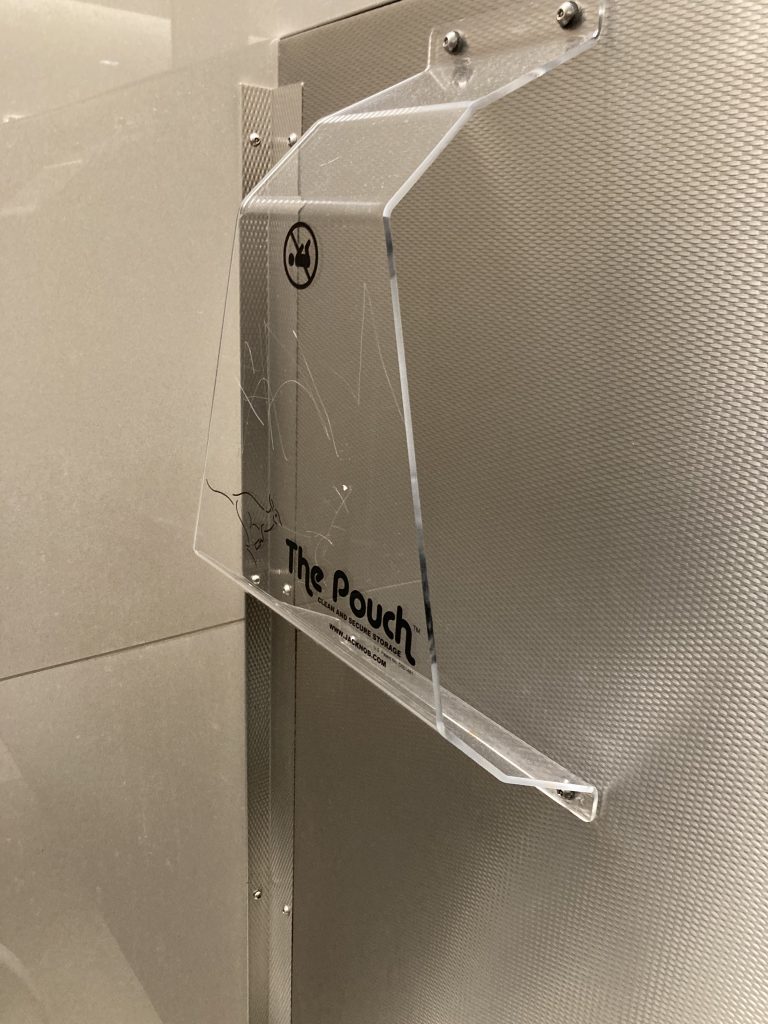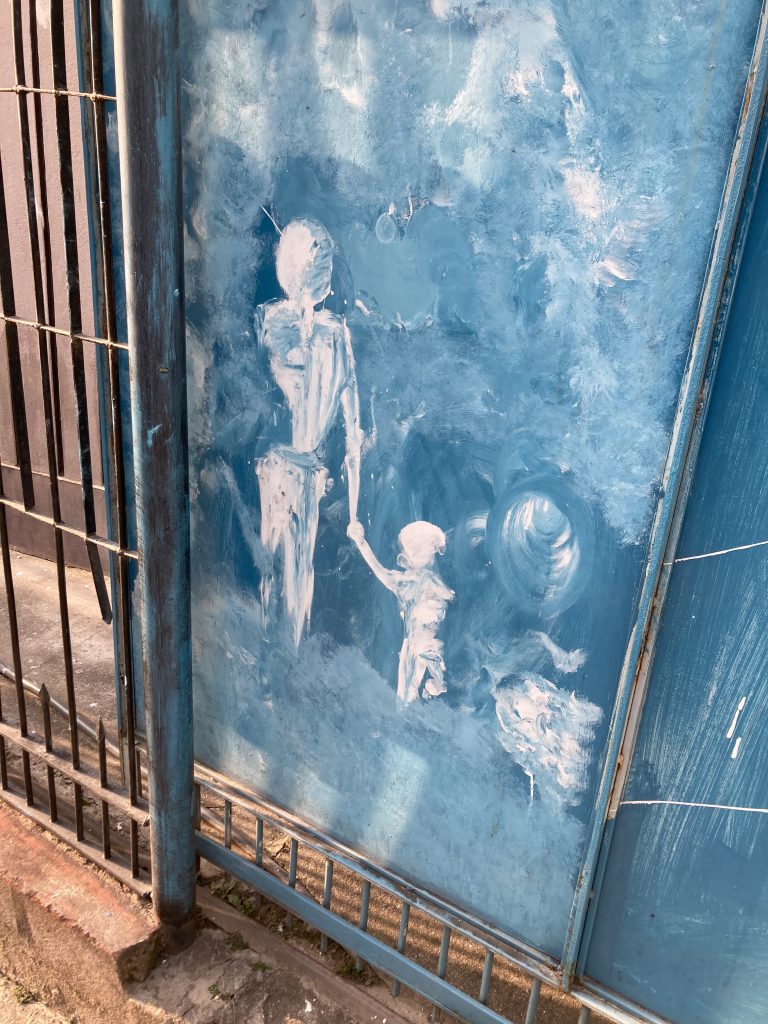vip


‘Strewn across the Bentonite Hills like the remains of a dead god, ‘The Slumberjack’ eats dirt and crawls with artists, poets, and recreational drug users. Its hinged jaw is jammed open, gobbling up a stripe of red dirt on one side of the Sleepy Valley. The tips of its boots have sunk into the earth on the side opposite. Its axe has broken, the head lying in the sand nearly a mile south. Nobody knows what felled ‘The Slumberjack.’ Nobody knows why ‘The Slumberjack’ once stood where it stood. Nobody knows who made it. There are no businesses for miles around. There are no trees.’
“Maybe he just got tired,” I say. The woman behind me shrugs. “From, uh, cutting down all the trees.”
“There aren’t any trees here.”
“Exactly.”
The woman shrugs again.
With all of the hitchhiking I’ve been doing, I saw this woman, Eliza, hitching to ‘The Slumberjack’ and thought I’d pay into the pot a little. I’m not sure which of us regrets it more. I’ve fallen out of the habit of making good conversation and have been trying too hard. She smells like sweat and is sweating onto me, shoved up against my back by Hector’s kennel. Given the choice between a few hours walking and the ride, I wonder if she’d ask for a do-over.
‘The Slumberjack’ comes into view again. It’s stripped white like a Greek statue, almost blinding in the sun. A haphazard rope and pulley system towers above it, anchored at the heels. Anchors have been placed along ‘The Slumberjack’s’ back- one faction’s attempt at restoring it to standing. The chains hang loosely, now, rattling in the wind. The neck is split from the weight of the body. A dark spiderweb fracture crawls down the spine. Something moves in that darkness- an arm. It reaches out of the back and tosses a can out into the desert.
“Cool commune,” I tell her.
Eliza sniffs. “People used to care more.”
“There are a lot of cans below that one.”
“Used to as in a long time ago,” she says and then, like I wouldn’t here her, she mumbles: “That’s about to change.”
I pull over.
“What’s going on?” She asks.
“Why’d you just sound like a revolutionary or, like, a disgraced king?”
Eliza blushes beneath the grime. “I just said that was a long time ago.”
Hector shifts uneasily in his kennel.
“Sure you didn’t say anything else?”
Eliza touches the handgun in her jacket. I’d noticed it after I stopped and after it seemed like a good idea to change my mind about picking her up. She thinks better of it. Doesn’t know that I know. Not that it helps me. Killing people is just messy, no matter how you go about it.
“I’ve got a job to finish,” she says, as though the weighty tone makes up for the vague nonsense she’s spouting.
I try to find a reason to get closer to her, in case my survival depends on knocking the gun out of her hands. She backs up as casually as I step forward- not as oblivious as I thought. I circle back to the bike, instead, thinking that at least it will make for a quick getaway. I dig for my travel mug as though running were the last thing on my mind. “You’re one of the ones trying to lift him?”
“I’m the one,” she says. “I was there at the fall.”
‘No, ‘the fall’ rarely refers to whatever happened to ‘The Slumberjack’ that took it from its presumed original position to the face-first dirt nap it holds now. The fall occurred in 2017 when ‘Slumberjack’ residents banded together to right the statue with the enthusiasm and engineering knowledge one might expect from such a group. It rose just far enough from the ground that the eventual buckling of the spine and collapse of the crane caused a great deal of structural damage, leaving ‘The Slumberjack’ in far worse shape than it ever had been and making the idea of raising it even more farfetched. Infighting followed, needless to say, and ‘The Slumberjack’ community slipped neatly from peace and love to the tense, cult-like militarism of late-stage communes. The early expulsion of their leader, a nineteen year-old woman from-’
“Oh, you’re her.” I grimace, remembering the passage now.
Eliza touches her jacket, again, reassuring herself with the presence of the gun. She’s turned halfway to ‘The Slumberjack,’ surveying it like she’s already won it back.
My own gun, the one I took from ‘The Dakota Obelisk,’ the one I soaked in ‘The Shiver Pool,’ sits heavy at the very bottom of my bag. It’s loaded, only because I’m afraid I’d lose the bullets if they weren’t with the gun. It’s clean, because I keep wrapped in plastic, away from all the crumbs that accumulate in my bag. I peel that plastic back, now, making sure to keep it out of sight. Eliza looks over and then turns fully away, her attention on activity around ‘The Slumberjack.’ The sound of the crinkling plastic is reassuring to her. She thinks I’m digging out a sandwich. A granola bar.
The metal is cold. The gun is heavy. I have it in my hands, have it pointed at her back, long enough that my arms get tired. I try to think of a way to get her attention. I wonder if I couldn’t have just driven away but the sound of the engine, the kick into gear- it would have given her plenty of time to draw on me. Too much of a risk.
“Hey.” I say, and she kicks the dirt. Turns. It still hasn’t dawned on her. She thinks I’m ready to go. She freezes when she sees the gun. “Just put your hands in the air and-”
Eliza doesn’t seem to hear me. She ducks into the dirt and covers her head. She begins begging for her life- tells me I can take anything I want. It’s ugly. When I do finally get words through to her she pulls the pistol from her jacket and tosses it away like I ask, dripping snot into the red dust off the side of the highway. I kick it a little ways down the incline and keep my aim on her long enough to get back to the bike.
“I didn’t plan on doing this,” I tell her and she nods. She’s beyond conversation. Bowled over by fear. She agrees to everything I say, unthinkingly, even when I try to apologize. To contextualize. To accuse her of starting this by having a gun as well.
It doesn’t feel good. It makes me feel so bad, in fact, that I stupidly offer to drive her the rest of the way, which starts her weeping, again. Like I might be kidnapping her. It’s hard to say ‘no’ to anything when you’re held at gunpoint. I take the implied ‘no’ and tell her to stay on the ground at least until I’m out of sight.
To her credit, she does.
-traveler

I am nervous, of course. It started with the safe apprehension of someone that still had time to change their mind, the giddiness that sits where all nervous sits, in the stomach, but does so lightly. Perched like a bird and fluttering. As I changed buses and took people up on their offers of rides, the bird died. It’s a dead canary, weighing heavier than it should against my bladder and the nearer I come to meeting the stranger, the heavier it becomes.
It’s never been a good idea to meet with the Stranger, I’ve learned that much in hindsight. His intentions, his motivations, are all opaque to the point of nonsense. Opaque except they have been pointedly selfish, I think. At best, he’s used me as I use these people that pick me up when I’m hitchhiking: consensually, if not for mutual benefit. And certainly not with ulterior motives. I try to leave any car better than I find it. I try to listen when the driver wants to talk. I try to stay silent when they only want to drive. I don’t have the means to pay these people back. Not with money or love or any of that. All I have is time, really, and I make that clear before I ever get into a car.
The Stranger is the hitchhiker with the hidden knife. The one that steals. The one that disappears without a thank you. That disappears, sometimes, instantly and other times slowly, as though he’s fading smoke.
I wonder if he thinks it’s stupid to meet me. He hasn’t turned off the tracker. I can see him making his way toward me, even as I write. There is still time, I suppose, but the bird gets heavier and I stay where I am.
‘There is no such thing as neutral ground. This is true for the Wayside just as it’s true everywhere else. Spaces that advertise as neutral, where sworn enemies gather for tense conversations about mutual threats: they don’t exist. Generally, not at all, and absolutely not for long. ‘Neutral ground’ is conceptual and temporary and very, very fragile, because this is a capitalist society and there is inevitably someone that’s unwilling to buy in and there’s always someone in a position to pay.
‘Thrifty Gear’ is the closest possible thing to neutral ground that a person might find off the highway. It makes no promises of safety and its apathetic security force is hardly capable of identifying and reprimanding shoplifters let alone discerning between members of warring factions and enforcing any sort of peace. ‘Thrifty Gear’ is just a big, quiet, used gear outlet that doesn’t make for particularly good killing. Its customers are loyal and ornery enough to remember repeat offenders and to make their lives miserable on the road. It would be like killing someone in one’s local library. It can be done, sure. It might even be easy. But aren’t there better places? Of course there are.
That’s what this book is about.’
I’ve been to ‘Thrifty Gear’ a few times before but they’re always changing the layout and the layout has always been chaotic at best. Packs and jackets take up the racks. Old gas lanterns intermingle with flashlights in half a dozen crates. I find a flashlight that’s like mine but newer and pay for it right away so that I can just put it in my bag. I find some new blankets for Hector’s kennel in the rag fabric they sell by the pound in the back. I check my phone so often that the battery runs low and then I see that the Stranger’s icon overlaps mine.
He’s here somewhere.
I look around and don’t see him. I wander through the store and peer out into the parking lot, where my motorcycle is ticking in the cold. It looks dirty. Its tires need air. I have a spare key. For these reasons alone I should take the bike and drive away but that would risk ducking out between the cars and provoking an ambush and somehow it seems like the sort of thing the Stranger would do. I’m no stranger.
So, I do what the Stranger would want: I wander the inside of ‘Thrifty Gear,’ taking as many blind corners as I can so that he can suddenly appear as though he were the one that’s been waiting for me to arrive. And it works, sort of, because after a couple dozen turns I come upon him but he’s facing the opposite direction, standing straight but not so straight as to be formal, and his silky black rabbit is perched on his shoulder, fur draped down over him like a living cape. Neither seem to notice me until Hector snuffles in his kennel and then they both jump.
“Dammit,” the Stranger turns and pats his chest, making such a show of faking exasperation that I can see he’s really exasperated underneath. “You can’t sneak up on a man like that.”
“I used to couldn’t sneak up on you at all.”
“Well that’s your noisy-as-hell bike, I suppose. Deaf in both ears, now, and tracked like an animal.” He tosses me my GPS tracker, still sticky with adhesive. He throws another my way. “Thought I wouldn’t find both?”
I only had the one on the bike and I pause, considering whether to tell the Stranger this and whether he’d believe me or if this is all some ploy to make me paranoid. Who would be tracking me anyway? By the time I’ve pocketed the devices my silence has been received as anger.
“No hard feelings,” he says, and that’s the first thing that makes me legitimately angry.
“Where’d you get that?” I ask, pointing at his rabbit-thing.
“Rich folk have something like our Wayside. All handbags made of human leather and illegal surgeries. This guy’s like a rottweiler you wear. Pretty and pretty mean.”
“If it’s for rich people, how’d you get in?”
“Snuck.” The Stranger yawns, showing off his thick tongue, his teeth like a decrepit fence.
“You wanted to talk?”
“Just to settle things once and for all. You know I’dve killed you if I wanted back at the arches and I’d have killed you a few more times before that but I’m learning it pays to have a lookalike out here with me, doing the same things only a little nicer where I’m a little… rough.”
“We don’t look anything alike.”
The Stranger shrugs and strokes his rabbit until it nips at him. He drops the hand and drips blood on the linoleum. “I’ve done you wrong a few times, I’ll admit it, so what I propose now is a simple truce. You keep to your business and I keep to mine and we talk before fighting when those businesses happen to overlap.”
He holds out his hand and I swallow all the reasons this doesn’t quite seem fair. I take his hand and he smears blood on the inside of my wrist.
“Sorry about that,” he says, and he licks another finger to wipe it away. Once he’s finished, he stands straight again and sighs. “I sure feel better, now. Don’t you? Here’s to going our separate ways.”
He tosses me the key to the motorcycle and I wait for him to do his trick- to disappear into the coats or vanish as the lights flicker. Instead, he walks across the store to the checkout line and buys a couple old water bottles, struggling to find a twenty hidden in his back pocket.
“I don’t feel better about this at all,” I tell Hector, but he’s still in his kennel, lulled to sleep by the sounds of shopping.
-traveler

‘‘Tony’s Crab Shack’ is well known among New Englanders and, like any semi-iconic business on the east coast, there is no consensus as to the quality of the food or the worthiness of the atmosphere. For some, ‘Tony’s’ is the exact sort of slap in the face that modern dining needs- an egoless counter-cultural experience that other restaurants approach and fall short of. Dissenters mostly find the place gross.’
Carl is the mascot of ‘Tony’s Crab Shack.’ A crab, obviously. Red and cartoonish. An statue of Carl looms at the front of the restaurant and a quarter-scale but otherwise identical statue stands just inside, made of the sort of laminated rubber one finds in mall playgrounds, all grease and candy curves. Steam and butter thicken the air, even inside the ‘dressing room:’ the core aspect of ‘Tony’s’ novelty.
“We’ve got your bibs right here,” the hostess says. She’s brought eight of us in together: a family, a couple, and myself. “How many of you have been here before?”
The couple raises their hands and the rest of us look around uncomfortably. The ‘bibs’ she’s pointed to are full-length rubber gowns. They’re sleeved and tight-fitting, made of the sort of material that pulls up sleeves and tugs at arm hair. The hostess continues:
“Well, as I’m sure you’ve heard, ‘Tony’s’ is a messy place. A real pig-sty. It’s a place for people to eat messy things like they’re pigs in the mud.” The hostess runs her hand over her arm. “We have these bibs for you, if you want them. Some people don’t care. Those are the people we like best.”
Everyone but the couple puts on the bibs. We stand there, squeaking and sweating under the heavy rubber, while the hostess secures ties in the back.
“We’ve got to makes these tight,” she says, emphasizing the word by jerking the knot behind my neck. “Sometimes the butter drips down your chin, down over your throat, and you don’t even realize. Sometimes the butter makes its way up your sleeves, or it splashes on your chest. It gets everywhere, you know. The butter.” Something is seeping under the door behind her, thick and yellow. It congeals in the cool air let in from outside as we entered. The hostess sees us looking and nods: “It’s going to be slippery inside. Watch your step.”
‘Tony’s,’ as far as I can tell, has repurposed an old smoking/non-smoking divide to separate those of us who choose to eat in the industrial bibs and those who eat in grease-stained clothes, slopping crab meat and butter into their mouths with bare hands- pulling biscuit crumbs from the hair on their chest or scooping lost bread rolls straight from the shimmering wood beneath them. The couple is taken to a table, there. The man takes off his shirt.
I’m taken to the bib section and I turn to see that the family has declined to enter altogether. I see them struggling to untie the bibs just before the door closes, the hostess watching them with unfiltered disapproval.
The table I’m given sits in a far corner, holding only a small tea candle that I worry will set the place ablaze. Words have been carved into the heavy wood in front of me: NO MENUS. Butter thickens to white in the scrawl.
A waiter approaches, face obscured by a rubberized hazmat suit. They flip open a notepad, where, on the first page, they’ve written the word ‘Ready?’
“Have you ever eaten here?” I ask.
The waiter slowly nods their head, rubber gliding on rubber.
“Is it good?”
The waiter leans in close, braces their body against the table. Grease seeps from the slick seam around their neck. It drips onto the candle and the flame sputters out. Someone moans behind the divider. An insect struggles to fly in the thick air.
The waiter nods.
“Dinner for one, then,” I tell him, and within a minute or two I’m enjoying a pretty decent bucket of crab legs while someone approaches a climax, physical or spiritual, just out of sight.
I pop in my earbuds and eat until one of them starts to slide deeper into my head than seems advisable. I leave and shower at the nearest truck stop, which has stalls dedicated to showering off a ‘Tony’s’ dinner butter-sweat. I throw away my clothes and spend the night with Hector in the thin forest out back.
The GPS tracker on the bike ran out of battery nearly a week ago. This morning, it came back online. The Stranger has found it- has charged it- and he’s still on the move, which means he’s keeping a close eye on the device. He’ll hear it if it pings.
I pull up a morse code cheat sheet on my phone and start to type out a message. If ‘Tony’s’ has taught me anything, it’s that a little preparation and an open mind can redeem something that would otherwise leave a bad taste in my mouth.
-traveler

I wake to the shaking claustrophobia of the trunk of a car. Not my first time. Hector is in his kennel at my feet. He sniffs casually at my toes and settles back into a snooze. Not his first time either. Come to think of it, he spends much of his time in a shaking cage at the back of the motorcycle where the air is fresh, at least.
I probably should have re-homed him before something like this happened.
A low, sustainable worry persists in the back of my mind as I check the usual means of escape and find them unlikely to work. The trunk is secured closed. My hands are tied behind my back. My pockets have been emptied of everything that might prove useful. Nothing to do but wait and worry just enough.
The worry spikes a bit when the car stops. Spikes a little harder when I hear the sound of a woman crying near the car. Someone, the Stranger, exchanges words with another man. They come to some agreement, change their tones to gratitude, and the car begins to move again. The voices, the man and the crying woman, fade.
Over the next fifteen minutes there are more. Two men scream at each other. Something shatters against the side of the car and someone shouts an apology. There is a lot more crying before we seem to pull away from people altogether. I think about how thirsty I am- quite. I gauge my hunger- peckish. Without being able to see my watch I’d say I’ve been in the car a few hours at most and I put together where the Stranger has taken me. It was where I’d been heading anyway.
‘Going by many names as a necessity, ‘The Break-Up Arches’ describes a recurring series of sandstone formations, large enough to permit two or three people but small enough that, when a given arch invariably collapses, unlucky visitors are more likely to receive serious injuries rather than, say, die.
Why stand there at all? For the pictures, obviously, or for the promise of pictures that do not come since few will stoop to bringing a photographer to document one of the most raw, if common, romantic experiences.
‘The Break-Up Arches’ is a place for ending relationships, made famous by a very early attempt at a wedding, this one forever preserved in black and white film. The picture captures the chaotic moment when the bride-to-be experiences her the last straw as it pertains to the slovenly-looking man beside her. He reels from something she has spit in his face. She turns, preparing to walk off. The arch above them is cracked through, is coming down on top of them both.
Circulation of the picture, newly digitized, in the early 2000s sparked a tradition for taking a ‘loved one’ to ‘The Break-Up Arches’ to call it quits, the reasoning being that the blow will be softened by the amount of thought and care it takes to orchestrate such an end or that the sandstone holds calming properties or that it just makes it easier to start the conversation, given that there will be a half dozen other howling couples around to get the point across.
Nobody said the reasoning was good, but the state of Utah seems to support it. They change the name of ‘The Break-up Arches’ on all roadside signage at the start of each season, giving it the name of a forlorn poet so as not to raise suspicion about whatever spontaneous road trip one unhappy lover has arranged for the other.’
It’s not a bad place to kill a person, really. People will be seeking privacy. People will be screaming and crying. Arches will fall and, despite what the guide says, it’s only a matter of time before they bury a person alive. The Stranger can torture me, kill me, and bring an arch down over my body. He’ll be across the country before they even consider it might be foul play.
The car rolls to a stop and I prepare myself for whatever’s about to happen. I hear footsteps outside and then a knock on the trunk. The Stranger speaks:
“I know you’re waiting to hit me in there,” he says. “You’ve probably wormed your way out of the ropes and are ready to jump me with a knife you had up your ass.” A flicker of embarrassment. This guy thinks I’m way more capable than I am. “I just want to talk, so I’m going to let you out with this fancy key-fob and you’re going to come slow.”
The trunk pops and I strain quietly against the ropes that bind my wrists and ankles.
The Stranger interrupts after a few moments: “If you’re going to play hard to get I’m going to play hard too. Come on out, now, before I have to do something drastic.”
My mouth isn’t gagged but I can’t quite bring myself to explain the situation to the Stranger. Hector hisses loudly somewhere in the darkness of the trunk.
“All right,” he sighs, voice weary all of the sudden. “I guess that’s the way it is.”
There are two loud blasts- a shotgun, I think- and then absolute silence as I try not to feel where I’ve been shot. After a moment, I decide I must be dead or entirely unharmed.
Then, the first rock hits the car.
I renew my struggle against the rope as the arch comes down over the vehicle, dust trickling in through cracks in the car, old and new. When I conclude that frantic strength under immediate threat of death is no better than the frantic strength I had used on the drive over (and under a more long-term threat of death), I notice that the arch has stopped falling and I’ve survived that as well.
It takes a few hours, but eventually I pry my shoe off and unlock Hector’s cage with my toes and slowly undo weeks of don’t-chew-rope training by convincing Hector that the rope around by wrists is actually fair game. Another hour of scrabbling in dust and stone and we surface under a starry sky and to the sound of some broken-hearted man whimpering nearby. He helps us the rest of the way out and we pay back the favor by listening to the sad story of how he emotionally neglected some poor woman for a year before she drove him to the arches to break it off.
Once I convince him there will be other woman to neglect in the future, I go about digging Hector’s kennel out of the trunk and my bag from the passenger seat of the crushed rental. My bike is, unsurprisingly, nowhere in sight. I pull up an app on my phone and see it, or at least the small knock-off GPS locator I stuck under the seat, is heading west.
It’s midnight by the time I slump back in the rubble and scratch Hector’s head. Then, it hits me.
Maybe he did just want to talk.
-traveler

© 2024 · Dylan Bach // Sun Logo - Jessica Hayworth